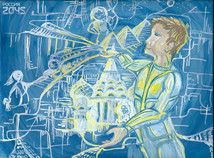/ Фото конкурс

15. Юлия Медведева. Неочеловек в мировой сети / Yulia Medvedeva. The Neo-Human in the Worldwide Web
/ experts
- Professor at the University of Southern Maine, co-chairman of GF2045
 Barry
Barry
Rodrigue"While innovation is often presented as a technological process, it also needs to be applied everywhere and to everything. We need innovation in human affairs, from family relations to business affairs. Innovation has to address both ecological balance of species and destruction of inorganic habitats. Alternatives must be found for warfare and the arms industry. In short, innovation is a process that applies to all existence..."
- Researcher, science debater, futurist, transhumanist, and author
 Anders
Anders
Sandberg"... I certainly think that practical benefits of being able to live for ever, if I transmit myself digitally, I will be able to run on bodies which are not biological or enhanced biological and be able to backup copies in case, if something goes wrong, would be enormous. So, I think, that in the future I am hoping to be software..."
- Professor, head of the laboratory in the Institute of Higher Nervous Activity and Neurophysiology RAS
 Alexander A.
Alexander A.
Frolov‘The problem of creating artificial memory devices capable of storing the natural memory of a given individual is, understandably, complex but by no means unsolvable...’
- Artist, art theorist, Curator of the National Center of Contemporary Arts (Kaliningrad branch)
 Dmitry H.
Dmitry H.
BULATOV‘In the near future, hybrid combinations of living and nonliving elements will help to recover lost or missing original features. And of course, greatly enhance them in comparison to the usual ones...’
- Ph.D. in Biology, Inventor of the "Bioartificial liver" device
 Professor Vyacheslav Y.
Professor Vyacheslav Y.
RYABININ - Ph.D. in Biology, Head of the Neurophysiology and Neural Interfaces Lab at the Russian State University Biology Department (MGU)
 Professor Alexander Y.
Professor Alexander Y.
KAPLAN‘By the time sustaining a brain artificially becomes possible, bio-robots will have been perfected to the point of looking like a decent human body...’
- Correspondent member of RAS, professor of the Moscow State University, head of the laboratory “Psychology of communications and psychosemantics” (MSU)
 Viktor F.
Viktor F.
Petrenko"I think that as a working hypothesis, it is possible that forms of contacts with highly advanced civilizations are possible as a result of this profound meditation..."
- Doctor of philosophy, professor
 Sergei V.
Sergei V.
KrichevskiyOne temporary solution, in my opinion, is to create a “cosmic person”, and start doing so on Earth, within the “future person” project, as part of the “Russia 2045” Initiative.
- Doctor of physics and mathematics, Head of the Department of Neuroinformatics at the Center for Optical Neural Technologies of the Scientific Research Institute for System Analysis of the Russian Academy of Sciences
 Witali L.
Witali L.
Dunin-Barkowski' If the job is to be taken seriously, we can get a detailed model of a brain prototype within five years or so. And since many research areas concerned with the subject develop in parallel, it may well be that we can achieve these results even faster...'
- Ph.D. in Physical and Mathematical Sciences, Senior Researcher of the Heat-Resistant Thermoplastics Laboratory at ISPM (Russian Academy of Sciences), creator of nanosensor neurologic ‘Electronic nose’ system
 Mikhail Y.
Mikhail Y.
YABLOKOV‘When creating an artificial human, we need to add an emotional trend to the predominant robotics one. It’s an all-inclusive idea, and it’s in the air...’








 LinkedIn
LinkedIn
 LiveJournal
LiveJournal
 Google
Google
 Twitter
Twitter
 Facebook
Facebook
 Я.ру
Я.ру
 ВКонтакте
ВКонтакте
 Mail.ru
Mail.ru